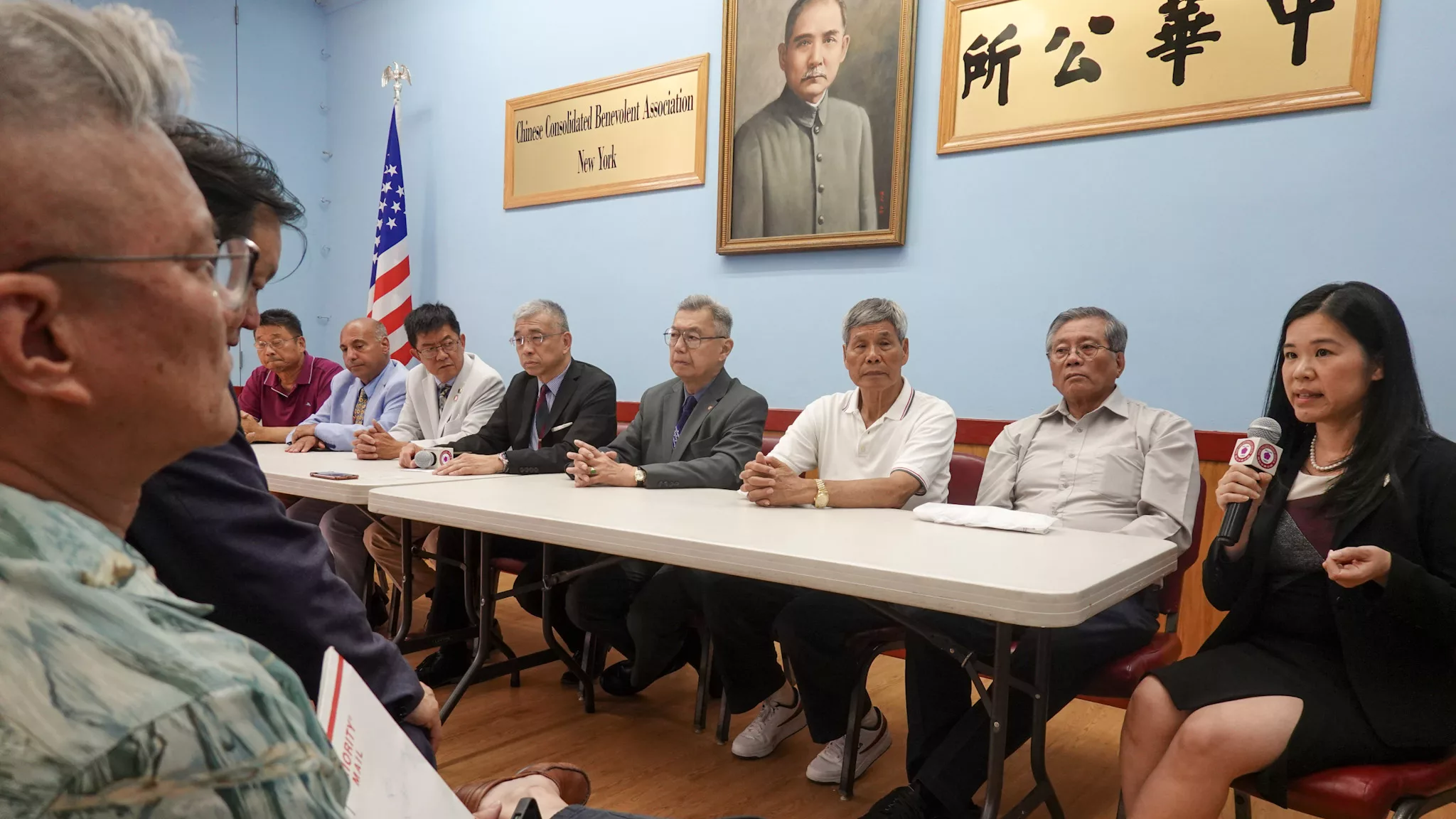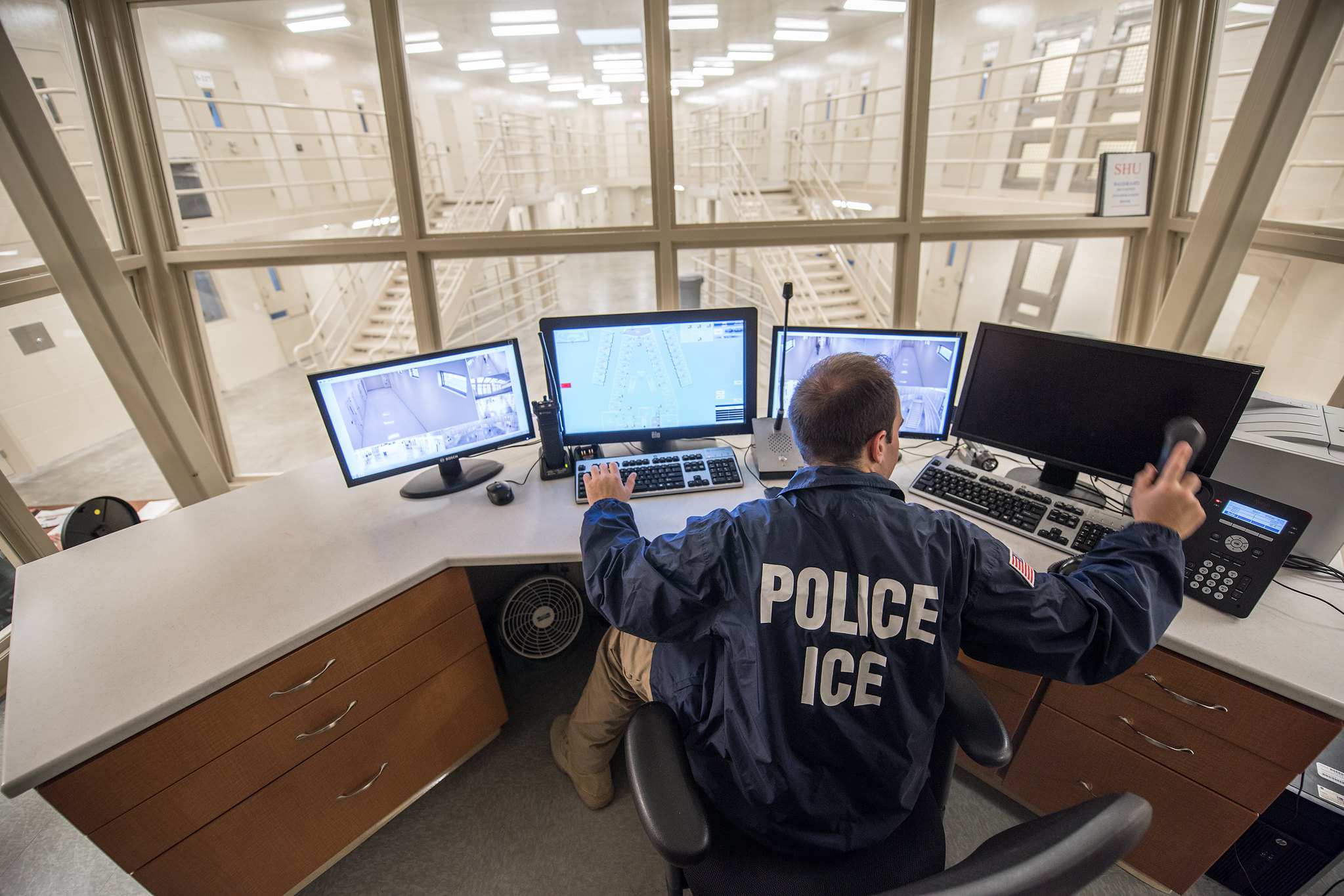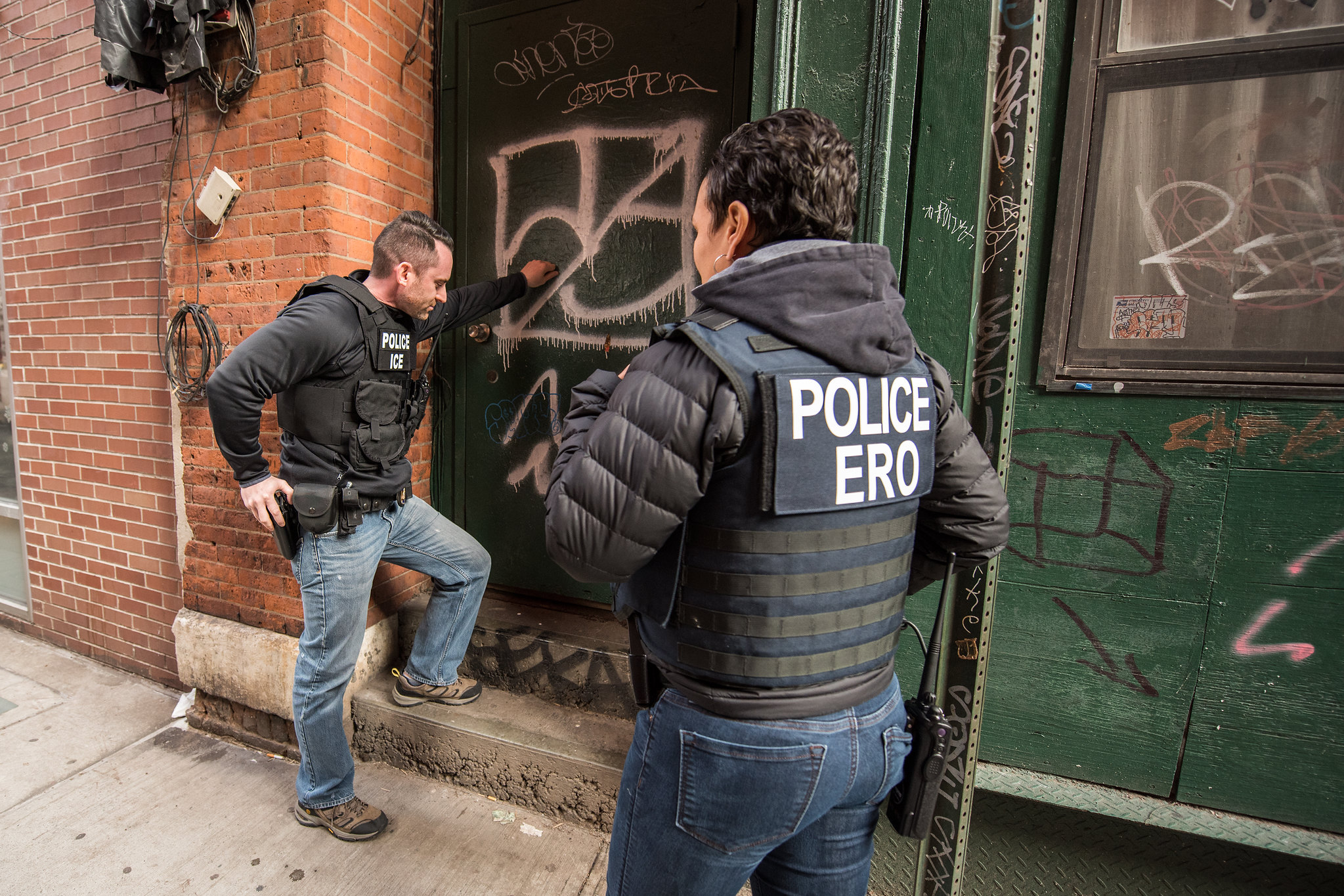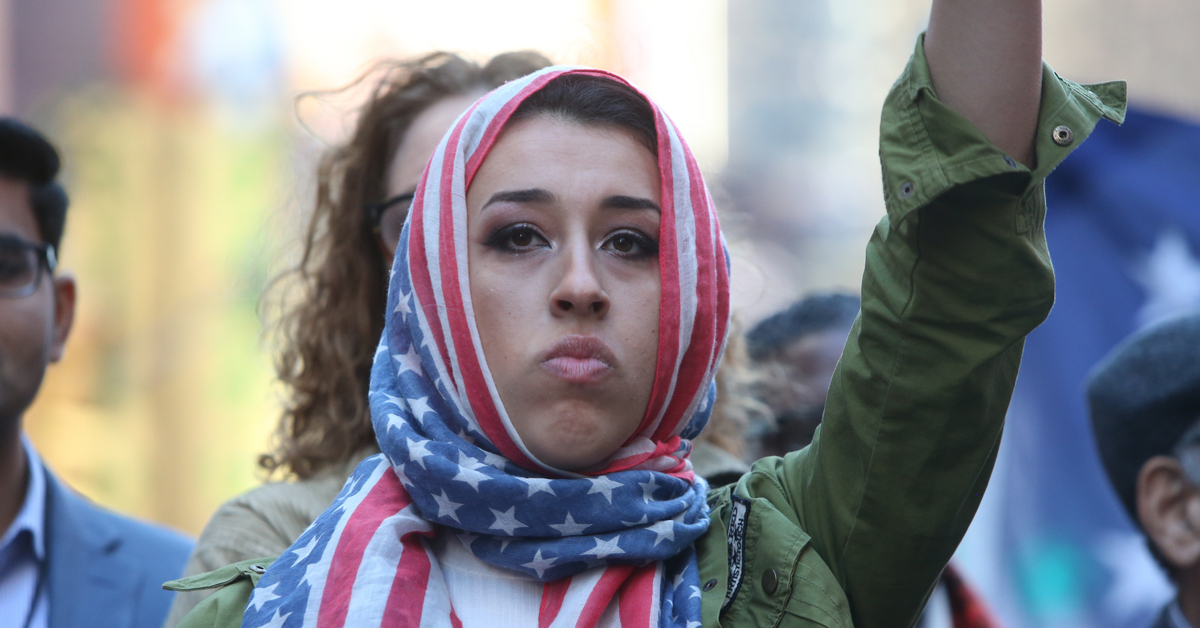After former President Donald Trump was shot at on July 13, the New York Post falsely claimed a “Chinese man” was behind the attempted assassination. While the news was corrected, it quickly spread on Chinese-language social media WeChat and ignited enormous anger among Chinese American communities.
On Monday, several Chinese community representatives held a press conference at the Chinese Consolidated Benevolent Association in Chinatown to request a formal apology from the Post.
Many condemned the article as “unprofessional” and “irresponsible.” The false report reignited fears of anti-Asian backlash, echoing pandemic-era discrimination and highlighting the media’s role in racial tensions.
The inaccurate article was first published at 7:39 p.m. ET on July 13, titled “Gunman behind attempted assassination on Trump shot and killed by Secret Service: sources,” according to a screenshot obtained by Documented. It identified the person who shot Trump as “a Chinese man.” At 8:51 p.m., the article was corrected to describe the shooter as “a white male.”
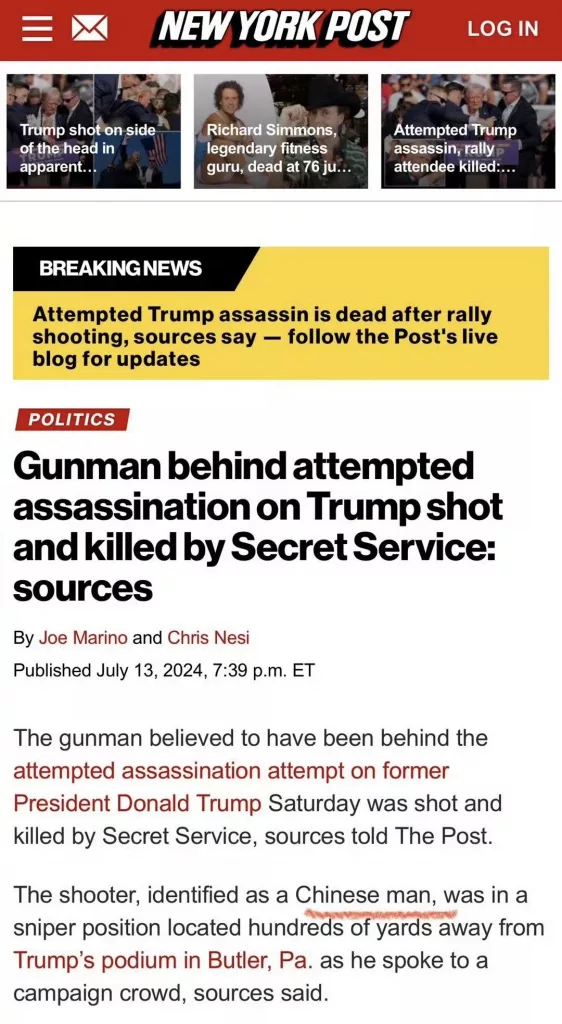
At the press conference, many demanded that the New York Post formally apologize to the Asian community for the negative impact of their report. On Monday, the New York Post only published part of a letter written by the Committee of 100, one of the nation’s leading non-profit organizations of Chinese Americans, in its “Opinion, Letters to the Editor” section. The Post also included an Editor’s Note in the original article saying they “sincerely apologize for the error.”
Also Read: Trump Lied About Immigration and the Border. Biden Brought A Poor Defense to the Debate.
The letter called for a public apology, a disclaimer in the story, and stricter editorial guidelines.
As of publication of this article, the Post did not answer Documented’s questions regarding how the mistake happened and what measures they will take to avoid such errors in the future.
“The story caused the Chinese American community additional harm,” said Lester Chang, the first and only Chinese Republican assemblyman representing Brooklyn’s 49th district, at the conference. He noted that political rhetoric has blamed Chinese Americans for the pandemic, adding, “In this current era of heightened anti-Asian hate, Chinese Americans and the Asian American community are already looking over their shoulders daily.”
Chang mentioned that the New York Post requested his permission to repost the email he sent to the publication, which addressed the concerns of the Chinese community. (Note, as of publication, the Post did not republish Chang’s email online or in print.)
Cindy Tsai, Interim President and Executive Director of the Committee of 100, emphasized at the conference that anti-Asian hate is not just a relic of the past during the pandemic, “We will also be asking our government officials to take anti-Asian hate seriously, as it is still very real today.”
In the past two days, several Asian American elected officials and Chinese community organizations have issued statements condemning the New York Post’s error and reached out to the New York Post.
Chinese community activist Queenie Ho was one of the first to contact the New York Post after finding the error. She said that she felt scared when she first saw the news.
“It reminded me of everything the Asian community went through during the pandemic — being attacked, bullied, pushed down, and even killed. We don’t want to see anything that could incite more racism against Chinese people.”
She immediately contacted one of the article’s authors, Joe Marino, and demanded an apology to the Chinese community. Although Ho said that Marino agreed with her about issuing a formal apology at the time, when Ho followed up the next day, she was told the mistake was “a brief momentary error in an online story that no one has picked up on” and “was fixed online.” She was told to address her questions about the apology with his managing editor, according to the chat history reviewed by Documented.
The original article was cited and can still be found on platforms such as X (formerly known as Twitter), where one of the posts referencing the incorrect article has now accumulated over 1.6 million views.
“On Saturday, our community and country were shocked by an act of political violence that went against the values of all Americans. That’s why I was incredibly disappointed and disturbed during this highly emotional time,” said Councilmember Sandra Ung in a statement. “I believe the Post owes the Chinese and entire Asian American community an apology.”
Also Read: Chinatown Feels Abandoned As Anti-Asian Hate Crimes Persist
State Senator John Liu stated, “Falsely identifying the shooter as Chinese in the heat of an assassination investigation is dangerous to Asian Americans. The New York Post must own up to its mistakes and apologize for this disturbing lack of journalistic integrity.”
“Accurate and responsible reporting is crucial, especially in sensitive cases that can have profound impacts on individuals and communities,” said Senator Iwen Chu, urging the publication to take measures to prevent such errors in the future.
Councilwoman Susan Zhuang criticized the New York Post for not doing its due diligence and called the misinformation “reckless and dangerous.” She urged the publication to formally issue a retraction and apologize for the mistake.
The Chinatown East Neighborhood Council is mobilizing its members to send letters to pressure the New York Post. The letter also condemns any act of political violence.
“This reckless reporting, especially in today’s inflamed political climate, is dangerous to our communities,” tweeted Stop AAPI Hate, a national coalition aimed at addressing racism and discrimination affecting Asian Americans and Pacific Islanders.
“Dangerously irresponsible of @NYPost to wrongly claim the Trump shooter was a ‘Chinese man’ and then update the story without a correction notice,” tweeted the Asian American Journalists Association on X.
A spokesperson for the New York Post said in a statement to Documented, “We reported erroneous information that we had received from reliable sources during the initial phase of the investigation. We quickly corrected it. We regret our error.”
In Tuesday’s printed newspaper, the Post published a shortened version of a letter from Gary Locke, Committee of 100 chair, which they published online Monday, without the Editor’s Note. They did not publish a full version of the Committee of 100’s letter online or in print.
